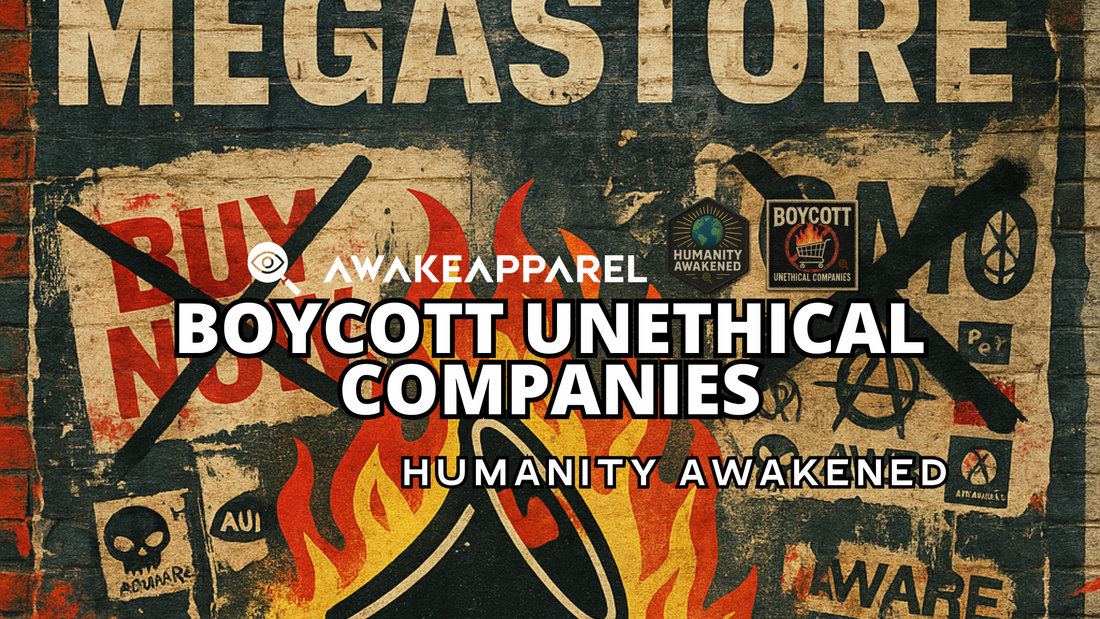
🔥 SPREAD THE TRUTH – Tap to Share!
BOYCOTT UNETHICAL COMPANIES
Stop Funding Your Own Oppression
📂 Category: Humanity Awakened – The Blueprint for Real Change
🔹 Focus: 💸 Economic Sovereignty
🪬 Feature: Boycott Unethical Companies
📡 Truth Trigger: “Starve the system by refusing to fund it.”
Boycotting unethical companies isn’t just conscious consumerism—it’s economic warfare. A direct strike against the corporate machines that profit from exploitation, environmental destruction, and political corruption.
These corporations:
- Exploit workers.
- Destroy ecosystems.
- Bribe politicians.
- Manipulate the masses with fake “woke” marketing.
✊ ![]() 🌍
🌍 ![]() ✊
✊ ![]() 🌍
🌍
And they only hold power because we keep giving them our money.
Every time you choose not to buy, you starve the beast.
🚫 No more sweatshops.
🚫 No more surveillance-funded tech.
🚫 No more poisoned food, fake sustainability, or corporate lies.
✊ ![]() 🌍
🌍 ![]() ✊
✊ ![]() 🌍
🌍
This is economic resistance.
Real change begins when we cut off their fuel supply.
💥 How to Boycott with Purpose
🔍 1. Expose the Lies
These corporations spend billions to look ethical. Don’t fall for the illusion.
Ask:
- Who really owns them? (Most are fronts for megacorps.)
- How do they treat workers? (Sweatshops? Union busting?)
- What’s the environmental cost? (Rainforest destruction? Toxic dumping?)
- Who do they donate to? (Lobbyists? Censorship regimes?)
✊ ![]() 🌍
🌍 ![]() ✊
✊ ![]() 🌍
🌍
✅ Use independent watchdogs, ethical brand lists, and investigative reports to see past the PR.
🔄 2. Redirect Your Spending
Boycotting is only half the mission—rebuilding is the rest.
- Shop local.
- Support businesses aligned with truth and transparency.
- Choose companies that prioritize people over profit.
✊ ![]() 🌍
🌍 ![]() ✊
✊ ![]() 🌍
🌍
💵 Every dollar either feeds the system or funds the future. Choose consciously.
📢 3. Spread the Word
Most people have no idea what they’re funding when they swipe their card.
- Call it out on social media.
- Share articles, documentaries, and investigations.
- Spark conversation in your community.
✊ ![]() 🌍
🌍 ![]() ✊
✊ ![]() 🌍
🌍
Truth spreads fast—if you light the match.
🔥 4. Pressure From Within
Corporations fear public backlash more than regulation.
- Email leadership directly.
- Flood their social channels.
- Sign petitions, organize campaigns, and name names.
✊ ![]() 🌍
🌍 ![]() ✊
✊ ![]() 🌍
🌍
Don’t let them hide behind silence or spin.
🧼 5. Watch for Greenwashing
Once exposed, they’ll try to rebrand.
- “Sustainability pledges” with no follow-through.
- Eco-friendly ads masking environmental destruction.
- Token gestures while the core corruption stays.
✊ ![]() 🌍
🌍 ![]() ✊
✊ ![]() 🌍
🌍
Demand receipts, not just statements.
👥 6. Build Local Awareness
The system wants isolated consumers. We need informed communities.
- Host events on ethical consumption.
- Share guides on how to spot manipulation.
- Help people reconnect with small-scale, value-based businesses.
✊ ![]() 🌍
🌍 ![]() ✊
✊ ![]() 🌍
🌍
Collective awareness becomes collective power.
⚖️ 7. Push for Real Policy
Boycotts are powerful—but lasting change means cutting their lifeline.
- Fight for corporate accountability laws.
- Support policies on fair wages and environmental protection
- Expose and dismantle political lobbying networks.
✊ ![]() 🌍
🌍 ![]() ✊
✊ ![]() 🌍
🌍
Pull the plug on the system that protects their greed.
🧨 Final Thought: Starve the Beast. Build the Future.
We hold more power than they want us to know.
They need our compliance. Our dollars. Our silence.
When we refuse to fund our own oppression—we change the game.
🔥 Boycotting isn’t just resistance.
🔥 It’s revolution by subtraction.
✊ ![]() 🌍
🌍 ![]() ✊
✊ ![]() 🌍
🌍
Let’s hit them where it hurts.
Let’s build something better.
Let’s stop feeding the machine.
✂️ Time to Cut the Cord?:
- Cancel one subscription that doesn’t align
- Stop buying from companies exploiting people or planet
- Switch to ethical brands—even if it’s less convenient
What you fund, you fuel. Cut off their cash, and their power disappears.
![]()
We’ve never taken a dime from the corporations we call out. We answer only to the truth—and to you. If you believe in reclaiming power from profit-driven systems, your support helps us keep the message unfiltered and unstoppable.






